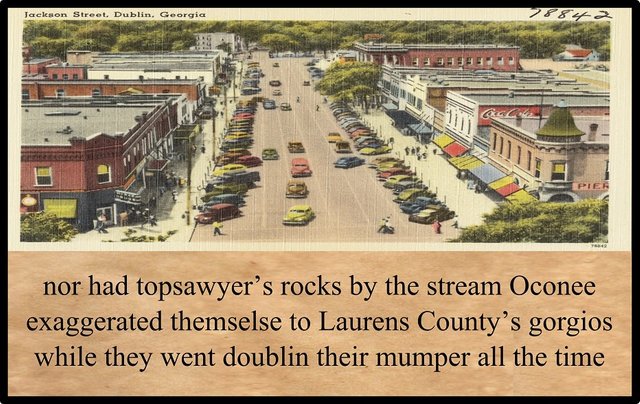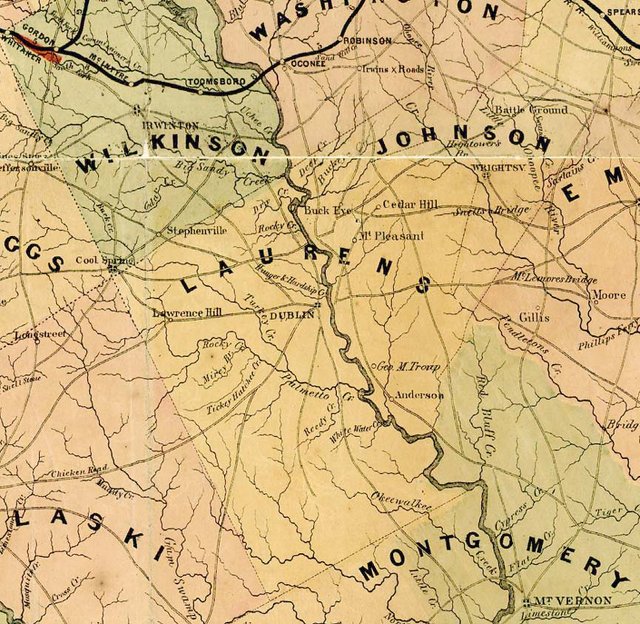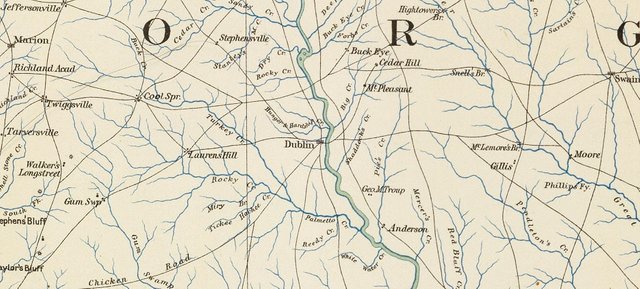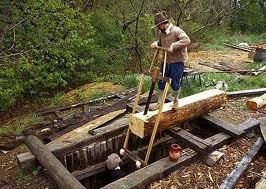Dublin, Georgia

The second of the seven clauses that comprise the second paragraph of Finnegans Wake was first drafted by Joyce in October 1926:
nor stones exaggerated theirselves in Laurens county, Ga, doubling all the time, (Hayman 46)
This was quickly revised to:
nor sham rocks by the Oconee exaggerated themselse to Laurens county, Ga, doubling all the time, (Hayman 46)
By 15 November 1926, when Joyce included the latest draft of this passage in a letter to his patron Harriet Shaw Weaver, it had become:
nor had stream rocks by the Oconee exaggerated themselse to Laurens County, Ga, doublin all the time; (Letters of James Joyce, 15 November 1926)
Although Joyce dropped the sham rocks of the second draft, this suggestive pun was much too fertile not to find a home elsewhere in the text of Finnegans Wake (see RFW 135.11).

Laurens County, Georgia
Georgia’s thirty-fourth county was named for Colonel John Laurens of South Carolina. Laurens was George Washington’s aide-de-camp during the American Revolutionary War. He took part in the Siege of Savannah in 1779, and died in the Battle of the Combahee River in 1782. It is another happy coincidence that his surname sounds like the Christian name of Lawrence O’Toole, Archbishop and Patron Saint of Dublin (Ireland), and a character in Finnegans Wake.
In that same letter to Harriet Shaw Weaver, Joyce appended some explanatory notes to the passage—key to same—which included the following nugget:
Dublin, Laurens Co, Georgia, founded by a Dubliner, Peter Sawyer, on r. Oconee. Its motto: Doubling all the time. (Letters of James Joyce 15 November 1926)
I have not been able to discover Joyce’s source for this mixture of information and misinformation. Dublin, Georgia, was not quite founded by Dubliner Peter Sawyer. The Laurens County Board of Commissioners has it that it was this way:
The Dec. 1807 legislation creating Laurens County made no provision for designating a county seat but provided that courts and public business be conducted at the house of Peter Thomas. It is not clear where Thomas lived, but it may have been at or near a settlement known as Sumterville, which was situated on the confluence of Turkey Creek and the Oconee River about eight miles from what would become Dublin.
On Dec. 1, 1809, the General Assembly designated Sumterville as county seat (Ga. Laws 1809, p. 10). However, on Dec. 13, 1810, the legislature named John G. Underwood, Jethro Spivey, Benjamin Adams, John Thomas, and William H. Mathews as commissioners to purchase up to 200 1/2 acres at or within two miles of the place known as Sand Bar on the Oconee River for location of the county seat (Ga. Laws 1810, p. 95). The commissioners selected land lot 232 in the 1st District—site of the new town of Dublin—and on Dec. 13, 1811, the legislature formally designated Dublin as county seat. Jonathan Sawyer, an Irish immigrant, had agreed to donate the land for erection of public buildings providing the town was named for Dublin, Ireland—the original home of his wife. The General Assembly incorporated Dublin by an act of Dec. 9, 1812 (Ga. Laws 1812, p. 94). (Laurens County, Georgia)
So the man’s name was Jonathan Sawyer, and though he was Irish, he was not necessarily a Dubliner. Curiously, neither was his wife:
In June of 1811, Sawyer was appointed postmaster of a new post office. Sawyer’s wife, Elizabeth McCormick, was a native of Baltimore, Maryland, and a progeny of Dublin, Ireland. She died in childbirth a couple of years before. Sawyer, as postmaster, was given the right to choose the name of the new post office, which he named Dublin, in honor of the capital of his wife’s ancestral homeland. (History of Laurens County, Georgia)
It is possible that Joyce confused Peter Thomas and Jonathan Sawyer. Christ founded his Church on a rock called Peter. Joyce was all too happy to accept that Dublin GA was founded on another Peter.
I came across another curious detail of the story in George Gillman Smith’s The Story of Georgia and the Georgia People, 1732-1860 (1900):
In 1809 a part of [Laurens County] was added to the new county of Pulaski, and a part of Washington and Montgomery was added to Laurens. No public buildings had been erected at Sumterville [the original county seat], and when this new addition was made to the county it was decided to put the county site at a point nearer the river, and an Irishman who had a sawmill offered land for the public buildings, provided he was permitted to give the county site a name. This was agreed to, and with the remembrance of his native isle present, he called the coming village Dublin. (Smith 284)
Is it possible, then, than Jonathan was a sawyer by profession, rather than a Sawyer by name?

Dublin, Georgia
Was Doubling all the time! ever the motto of Dublin GA? Apparently not:
Doubling all the time. According to McHugh, motto of Dublin, Georgia (seat of Laurens County) ... However, the Office of the City Manager of Dublin, Georgia, has no record of this motto ever having been used (letter to the author, 25 July 1984) (O’Shea 153)
The following passage from Scott Thompson’s Dublin: The Emerald City (2000) suggests the true origin of this phrase:
During the first decade of the 20th century, Dublin was the third fastest growing city in Georgia. Dublin grew so fast that boosters named it “The only town in Georgia, that’s doublin all the time.” (Thompson 7)
Dublin, Georgia, is a double of Dublin, Ireland. In Finnegans Wake, the history of the Old World is being continually repeated in the New World. Joyce was not the first famous writer to trade on this pun in Dublin’s name. It is said that the city of Lindalino in Jonathan Swift’s Gulliver’s Travels is based on Dublin, which is why its name has a double lin in it.
Topsawyer’s Rocks
According to Roland McHugh’s Annotations to Finnegans Wake, Topsawyer’s Rock is a natural formation on the Oconee River, but no source is given and I have not been able to confirm McHugh’s claim. Sawmills were once very common in Georgia, so such a name would not be out of place.
Topsawyer also suggests Tom Sawyer. In Finnegans Wake, Mark Twain’s two iconic characters, Tom Sawyer and Huckleberry Finn, frequently stand in for the rival twin sons of HCE and ALP, Shaun and Shem (respectively):
When men are sawing timber over a saw pit, a top sawyer stands above the log; a pit sawyer stands below. This image carries forward the idea of the opposed brothers ... (Campbell, Robinson & Epstein 26)
Also, Samuel Langhorne Clemens’ pen name suggests an American twin or double of the Old World’s Mark—King Mark of Cornwall, who was conjured up in the preceding clause by the reference to Sir Tristram. Mark Twain’s wife was called Olivia, which chimes well with Anna Livia.
And finally, in Chapter 5 of Charles Dickens’ autobiographical novel David Copperfield, the naïve David is bilked out of half a pint of ale by a dishonest waiter who tells him that: a stout gentleman, by the name of Topsawyer died the previous day after drinking a glass of ale! This foreshadows the story of Finnegan’s Wake, the Irish-American ballad from which Joyce borrowed the title of Finnegans Wake (Hold the apostrophe!). In the song, which is featured at RFW 004.09 ff, an Irishman dies after overindulging in whiskey.
If the first clause in this paragraph—Sir Tristram, etc—depicts the Oedipal event, in which a young upstart overthrows HCE, takes his place, lies in his bed, and becomes the new HCE, then the second clause depicts the result of that coup. History repeats itself in this New World. A new generation of children is fathered.
References
- Joseph Campbell, Henry Morton Robinson, Edmund L Epstein (editor), A Skeleton Key to Finnegans Wake, New World Library, Novato CA (2005)
- Charles Dickens, David Copperfield, Volume 1, T B Peterson, Philadelphia (1850)
- David Hayman, A First-Draft Version of Finnegans Wake, University of Texas Press, Austin TX (1963)
- James Joyce, Finnegans Wake, Faber & Faber Limited, London (1939)
- Michael J O’Shea, James Joyce and Heraldry, State University of New York Press, Albany (1986)
- Danis Rose, John O’Hanlon, The Restored Finnegans Wake, Penguin Classics, London (2012)
- George Gillman Smith, The Story of Georgia and the Georgia People, 1732-1860, George G Smith, Atlanta GA (1900)
- Jonathan Swift, Gulliver’s Travels, The Prose Works of Jonathan Swift, D. D., Volume VIII, Edited by G Ravenscroft Dennis, George Bell & Sons, London (1905)
- Scott Thompson, Dublin: The Emerald City, Arcadia Publishing, Charleston SC (2000)
Image Credits
Jackson Street, Dublin, Georgia: Wikimedia Commons, Public Domain
Laurens County, Georgia: GeorgiaINFO, Lloyd’s Topographical Map of Georgia, New York (1864), Public Domain
Dublin, Georgia, on the Oconee River: David Rumsey Map Collection, United States War Department, US Government Printing Office, Washington DC (1895), Public Domain


i like your post. Keep posting And god bless you buddy
You have given well known books references and crefits that is one thing i like.
Great informative publication on history, my friend. I greet and I hope you keep showing this type of content
wow nice post my friend
A very good publication for the leader. I loved this very much. Thank you
excellent for your publication concerning the history of Dublin, Georgia. greeting from latinoamerca
Thank you very much for the entertaining and informative content really does a good job. greeting
I love the history and much more his publications.
Wow friend did not know anything about the history of Dublin, now I know a little of its history.
Thank you for this publication, Dublin as the 3rd fastest city in its growth.